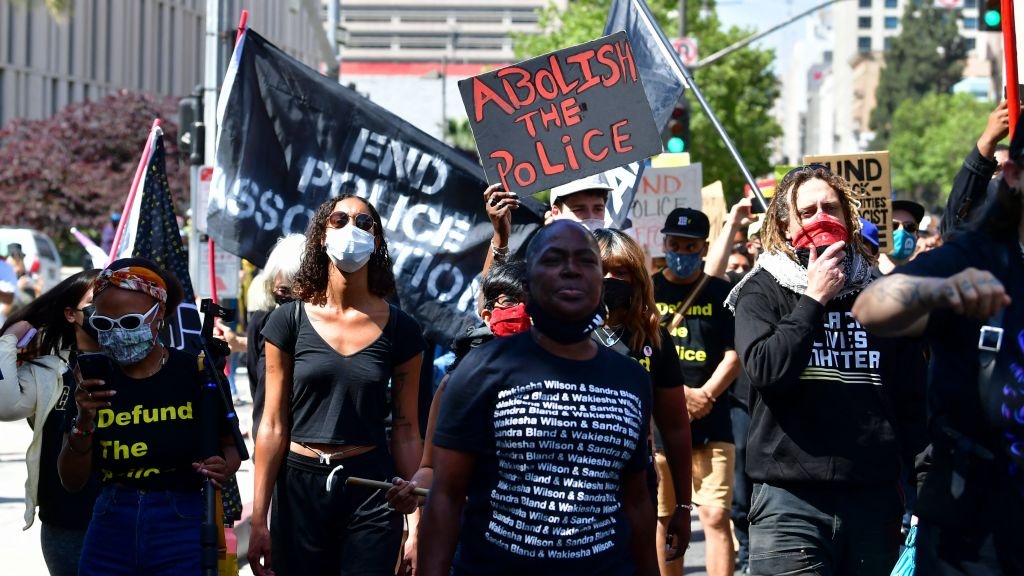Following the summer 2020 protests in the wake of George Floyd’s death, a new report released by the Movement for Black Lives, (M4BL) a coalition of Black advocacy groups, found that the federal government deliberately targeted activists by charging them with larger crimes.
The report, entitled “Struggle For Power: The Ongoing Persecution of Black Movement By The U.S. Government,” analyzed the use of federal criminal charges as opposed to state level indictments in an effort to “disrupt and discourage Black organizing.” From May 31, 2020 to Oct. 25, 2020, the report evaluated the 326 criminal cases filed by U.S. federal prosecutors over alleged conduct related to Black Lives Matter protests.
“Black resistance and power-building threaten the economic interests and white supremacist agenda that uphold the existing social order,” the report began. “The empirical data and findings in this report largely corroborate what Black organizers have long known intellectually, intuitively, and from lived experience about the federal government’s disparate policing and prosecution of racial justice protests and related activity,” noting that Black persecution has been an ongoing trend for centuries in the United States.
The report highlights how federal officials filed a slew of charges against protesters over the five months following Floyd's death, including 105 for arson, which carries a five-year minimum prison sentence, 49 for civil disorder, 45 for assault against an officer and 30 felon-in-possession of a weapon cases. The report also found that a majority of the defendants in the 326 criminal cases filed were Black men.
"Every day Americans are now facing prison sentences in more distant locations, higher maximums and mandatory minimums, and no chance of parole as a result of exercising their First Amendment rights," Princess Masilungan of the Creating Law Enforcement Accountability & Responsibility Clinic (CLEAR), which co-authored the study, said in a news release, The Associated Press reported. "Incarceration often leads to income and job loss along with the separation of families. It not only harms the individual but also their families, organizations, and communities."
The report also investigated and emphasized the difference in how peaceful Black Lives Matter protesters were treated by law enforcement, who met activists with tear gas, heavy weapons, physical altercations and more, compared to the COVID-19 protests against mask mandates and local shutdowns.
“We want to really show how the U.S. government has continued to persecute the Black movement by surveillance, by criminalizing protests, and by using the criminal legal system to prevent people from protesting and punishing them for being engaged in protests by attempting to curtail their First Amendment rights,” Amara Enyia, The Movement for Black Lives’ policy research coordinator said.
“It is undeniable that racism plays a role,” she added. “It is structurally built into the fabric of this country and its institutions, which is why it’s been so difficult to eradicate. It’s based on institutions that were designed around racism and around the devaluing of Black people and the devaluing of Black lives.”
Another key finding in the report was the deployment of the National Guard into cities like Washington, D.C., Seattle and Portland, authorized by top executives such as former President Donald Trump and former Attorney General William Barr.
“We saw U.S. Attorney General Bill Barr overnight go from expressing some level of sympathy for racial justice protesters to labeling them as radical and violent agitators with absolutely no basis for that sort of characterization,” Ramzi Kassem, founding director of CLEAR and a law professor at the City University of New York said. “All of this was very transparently aimed at disrupting a Black-led movement for social justice that was happening both spontaneously and in an organized fashion nationwide.”
Now, M4BL and CLEAR are calling for people to demand reparations from the federal government, in addition to a formal apology for the historical use of excessive force in movements advocating for Black life and liberation. They also recommend pushing for the BREATHE Act, which would redefine the nation’s criminal justice system, defending activists by calling for amnesty for protestors and organizing against anti-protest legislation at the state and local levels.
“Regardless of how we are often painted, activists are people who have the audacity to believe that we can live in a better world, where people are safe, where people are not afraid of being murdered by the police,” Makia Green, a liberation organizer and co-conductor of the Washington D.C.-based group Harriet’s Wildest Dreams said. “There are attempts to stifle our movement but it is truly a reflection to our supporters, to our allies, and to the folks who showed up in the streets last year, of how beautiful and powerful this movement is.”
